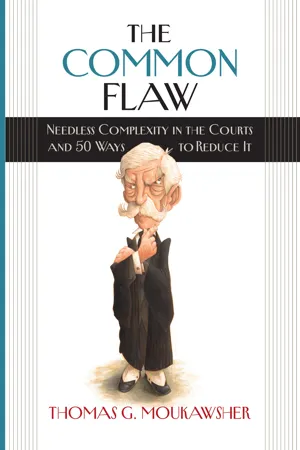
The Common Flaw
Needless Complexity in the Courts and 50 Ways to Reduce It
- 284 pages
- English
- ePUB (mobile friendly)
- Available on iOS & Android
About This Book
A sitting judge makes the compelling argument that we should simplify lawsuits to create a more humane and accessible legal system. Americans are losing faith in their courts. After long delays, judges often get rid of cases for technical reasons, or force litigants to settle rather than issue a decision. When they do decide cases, we can't understand why. The Common Flaw seeks to rid the American lawsuit of this needless complexity. The book proposes fifty changes from the filing of a complaint in court to the drafting of appellate decisions to replace the legal system's formalism with a kind of humanism. Thomas G. Moukawsher calls for courts that decide cases promptly based more on the facts than the law, that prioritize the parties involved over lawyers, that consider the consequences for the people and the public, and that use words we can all understand. Sure to spark an important conversation about court reform, The Common Flaw makes the case for a more effective and credible legal system with warmth and humor, incorporating cartoons alongside insightful reflection.
Frequently asked questions
Information
Table of contents
- Cover Page
- Title Page
- Copyright Page
- Dedication
- Contents
- Preface
- Acknowledgments
- 1. Prefer humanity to complexity
- 2. Rethink 90 percent of the typical complaint; make it about key facts, not law
- 3. Address basic pleading and proof deficiencies with a single motion
- 4. Decide cases once; use agency remands sparingly
- 5. Reconsider standing challenges; they invite more lawsuits
- 6. Reduce fighting over subject matter jurisdiction; the unheard will not remain unseen
- 7. Order discovery when a case begins; police it without written motions
- 8. Creatively manage complex cases; no case should be too big to try
- 9. Mediate, but don’t delay the case for it
- 10. Streamline trials; they’ll be more final, more credible
- 11. Directly involve judges in jury selection
- 12. Increase juror numbers and diversity with remote jury trials
- 13. Question the number of motions in limine
- 14. Most exhibits prove undisputed facts; we don’t need them
- 15. Actively oppose cumulative and time-wasting testimony
- 16. Too much expert testimony is discrediting experts
- 17. Consider common sense first in family court
- 18. Introduce time clocks to encourage efficient trials
- 19. Needless objections annoy judges and jurors
- 20. Make a point, not a muddle, with prior testimony
- 21. Punish misconduct when it happens rather than in a separate proceeding
- 22. Cross-examine crisply, crushingly, or not at all
- 23. Humanize overstuffed, bewildering jury charges and interrogatories
- 24. Save time in court trials by substituting longer closing arguments for posttrial briefing
- 25. Keep cases in the hands of a single judge from start to finish
- 26. Speed cases to trial with judicial administration instead of slowing them down
- 27. Accelerate and simplify justice with technology
- 28. Virtual proceedings should be the rule
- 29. As a judge, prefer the model of a village elder
- 30. Cases are better resolved on their facts than on the law
- 31. Deploy canons of construction sparingly—only when they have a compelling reason to exist
- 32. Rarely resort to legislative history; it’s often unreliable
- 33. Reduce distractions by identifying fallacies
- 34. Don’t blur laws to conquer facts
- 35. Endless consumer disclosures aren’t doing us any good; they are just low-hanging fruit
- 36. Reduce judicial testiness; use multipoint tests only when each point has meaning
- 37. Similar-sounding cases aren’t precedent
- 38. The best legal writing is literature, not formula
- 39. Don’t plod through the history of the case and familiar standards
- 40. Junk the jargon
- 41. Needless detail is . . .
- 42. The best appellate decisions deeply and plainly explain the law
- 43. There is a better home for law clerks outside of busy work and junior judging
- 44. Appellate courts should reform rusty rules
- 45. The best trial court decisions get straight to saying who wins and why
- 46. Needless complexity obscures our basically honest courts
- 47. Lawyers must discard outdated business models
- 48. Courts must reimagine themselves
- 49. Rethinking law clerking can remake the future
- 50. Recognize needful complexity and meaningful formality
- 51. Steady courts may mean a steadier country
- Illustration Credits
- Notes
- Index